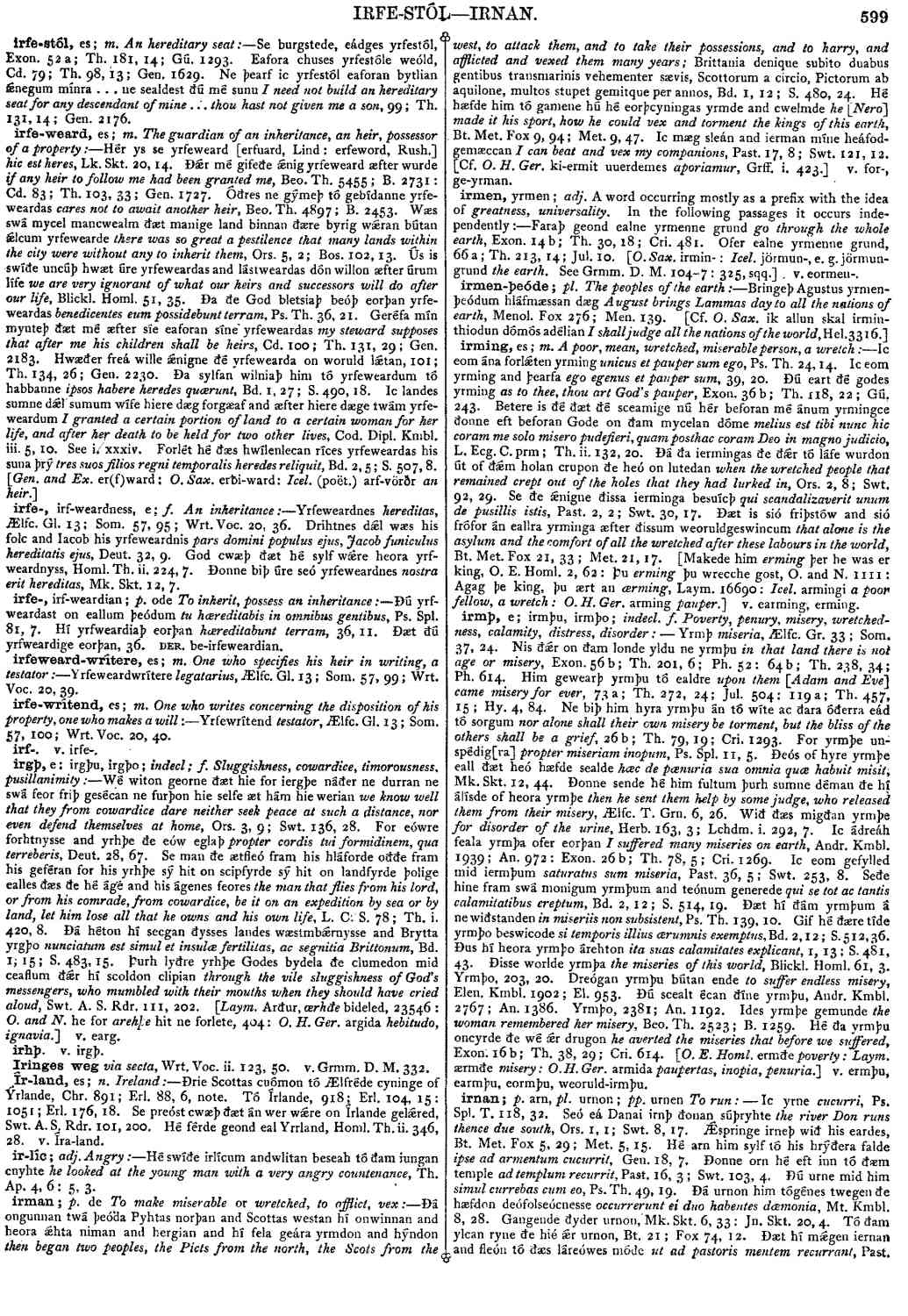irmþ
- noun [ feminine ]
-
Yrmþ
miseria,
- Ælfc. Gr. 33 ;
- Som. 37, 24 .
-
Nis ðǽr on ðam londe yldu ne yrmþu
in that land there is not age or misery,
- Exon. 56 b ;
- Th. 201, 6 ;
- Ph. 52 :
- 64 b ;
- Th. 238, 34 ;
- Ph. 614 .
-
Him gewearþ yrmþu tó ealdre
upon them [Adam and Eve] came misery for ever,
- 73 a ;
- Th. 272, 24 ;
- Jul. 504 ;
- 119 a ;
- Th. 457, 15 ;
- Hy. 4, 84 .
-
Ne biþ him hyra yrmþu án tó wíte ac ðara óðerra eád tó sorgum
nor alone shall their own misery be torment, but the bliss of the others shall be a grief,
- 26 b ;
- Th. 79, 19 ;
- Cri. 1293 .
-
For yrmþe unspédig[ra]
propter miseriam inopum,
- Ps. Spl. 11, 5 .
-
Ðeós of hyre yrmþe eall ðæt heó hæfde sealde
hæc de pænuria sua omnia quæ habuit misit,
- Mk. Skt. 12, 44 .
-
Ðonne sende hé him fultum þurh sumne déman ðe hí álísde of heora yrmþe
then he sent them help by some judge, who released them from their misery,
- Ælfc. T. Grn. 6, 26.
-
Wið ðæs migðan yrmþe
for disorder of the urine,
- Herb. 163, 3 ;
- Lchdm. i. 292, 7 .
-
Ic ádreáh feala yrmþa ofer eorþan
I suffered many miseries on earth,
- Andr. Kmbl. 1939 ;
- An. 972 :
- Exon. 26 b ;
- Th. 78, 5 ;
- Cri. 1269 .
-
Ic eom gefylled mid iermþum
saturatus sum miseria,
- Past. 36, 5 ;
- Swt. 253, 8 .
-
Seðe hine fram swá monigum yrmþum and teónum generede
qui se tot ac tantis calamitatibus ereptum,
- Bd. 2, 12 ;
- S. 514, 19.
-
Ðæt hí ðám yrmþum á ne wiðstanden
in miseriis non subsistent,
- Ps. Th. 139, 10 .
-
Gif hé ðære tíde yrmþo beswicode
si temporis illius ærumnis exemptus,
- Bd. 2, 12 ;
- S. 512, 36 .
-
Ðus hí heora yrmþo árehton
ita suas calamitates explicant,
- 1, 13 ;
- S. 481, 43 .
-
Ðisse worlde yrmþa
the miseries of this world,
- Blickl. Homl. 61, 3 .
-
Yrmþo,
- 203, 20 .
-
Dreógan yrmþu bútan ende
to suffer endless misery,
- Elen. Kmbl. 1902 ;
- El. 953 .
-
Ðú scealt écan ðíne yrmþu,
- Andr. Kmbl. 2767 ;
- An. 1386.
-
Yrmþo,
- 2381 ;
- An. 1192 .
-
Ides yrmþe gemunde
the woman remembered her misery,
- Beo. Th. 2523 ;
- B. 1259.
-
Hé ða yrmþu oncyrde ðe wé ǽr drugon
he averted the miseries that before we suffered,
- Exon. 16 b ;
- Th. 38, 29 ;
- Cri. 614 .
Bosworth, Joseph. “irmþ.” In An Anglo-Saxon Dictionary Online, edited by Thomas Northcote Toller, Christ Sean, and Ondřej Tichy. Prague: Faculty of Arts, Charles University, 2014. https://bosworthtoller.com/20785.
Checked: 1